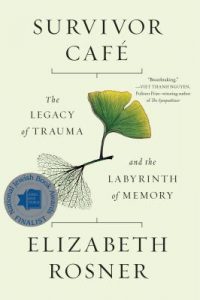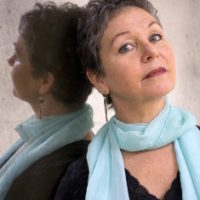Spotlight Nonfiction: Elizabeth Rosner
Elizabeth Rosner, author of Survivor Café (Counterpoint, 2017), as well as three novels and poetry collection, will read from and discuss her award-winning book of nonfiction. As featured on NPR and in the New York Times, Survivor Café is a bold work of nonfiction that examines the ways that survivors, witnesses, and post-war generations talk about and shape traumatic experiences.
This event is free and open to the public.
About Survivor Café
 As firsthand survivors of many of the twentieth century’s most monumental events—the Holocaust, Hiroshima, the Killing Fields—begin to pass away, Survivor Café addresses urgent questions: How do we carry those stories forward? How do we collectively ensure that the horrors of the past are not forgotten?
As firsthand survivors of many of the twentieth century’s most monumental events—the Holocaust, Hiroshima, the Killing Fields—begin to pass away, Survivor Café addresses urgent questions: How do we carry those stories forward? How do we collectively ensure that the horrors of the past are not forgotten?
Elizabeth Rosner organizes her book around three trips with her father to Buchenwald concentration camp—in 1983, in 1995, and in 2015—each journey an experience in which personal history confronts both commemoration and memorialization. She explores the echoes of similar legacies among descendants of African American slaves, descendants of Cambodian survivors of the Killing Fields, descendants of survivors of the bombing of Hiroshima and Nagasaki, and the effects of 9/11 on the general population. Examining current brain research, Rosner depicts the efforts to understand the intergenerational inheritance of trauma, as well as the intricacies of remembrance in the aftermath of atrocity. Survivor Café becomes a lens for numerous constructs of memory—from museums and commemorative sites to national reconciliation projects to small-group cross-cultural encounters.
About the Author
 Elizabeth Rosner is a bestselling novelist, poet, and essayist living in Berkeley, California. Her first book of nonfiction, Survivor Café: the Legacy of Trauma and the Labyrinth of Memory, was published in September 2017. Her third novel, Electric City, published in 2014, was named among the best books of the year by National Public Radio. The Speed of Light, Rosner’s acclaimed debut novel in 2001, was translated into nine languages. Shortlisted for the prestigious Prix Femina, the book won several literary prizes in both the US and Europe, including the Prix France Bleu Gironde; the Great Lakes Colleges Award for New Fiction; and Hadassah Magazine’s Ribalow Prize, judged by Elie Wiesel. Rosner’s essays have appeared in the New York Times Magazine, Elle, the Forward, and several anthologies; her poems have been published by Poetry, Catamaran, Poetry East, Southern Poetry Review, and many other journals.
Elizabeth Rosner is a bestselling novelist, poet, and essayist living in Berkeley, California. Her first book of nonfiction, Survivor Café: the Legacy of Trauma and the Labyrinth of Memory, was published in September 2017. Her third novel, Electric City, published in 2014, was named among the best books of the year by National Public Radio. The Speed of Light, Rosner’s acclaimed debut novel in 2001, was translated into nine languages. Shortlisted for the prestigious Prix Femina, the book won several literary prizes in both the US and Europe, including the Prix France Bleu Gironde; the Great Lakes Colleges Award for New Fiction; and Hadassah Magazine’s Ribalow Prize, judged by Elie Wiesel. Rosner’s essays have appeared in the New York Times Magazine, Elle, the Forward, and several anthologies; her poems have been published by Poetry, Catamaran, Poetry East, Southern Poetry Review, and many other journals.
